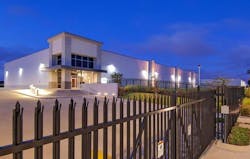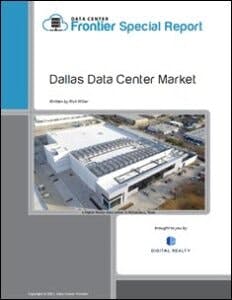Supply and Demand Trends Shape the Dallas Data Center Market
Last week we launched a special report series on the Dallas data center market. This week, we’ll look at trends in market supply and demand in the Dallas/Ft. Worth region.
Get the full report.
One of the primary factors driving data center activity in Dallas is the healthy economy and the growing list of large businesses, which generates demand for digital infrastructure.
Data center requirements in the DFW market come from companies both in and out of the market. The area is home to the corporate headquarters of 18 Fortune 500 companies including Exxon Mobil, JC Penney, AT&T, Texas Instruments, and others. State Farm’s data center in Richardson, just south of their 2.5 million SF regional office campus, is a good example.
In addition, a portion of the data center activity has come from companies tasked with upgrading aged data center infrastructure within an owned facility. Instead of reinvesting in the existing operation, many of those companies have chosen to house their infrastructure with colocation providers, fueling development in the area. This trend is pervasive across all major markets.
Companies from outside the Dallas market view the area as strategic for multiple reasons, including its central location. For enterprises that have data centers in primary coastal markets such as Northern California or New York City, the DFW market is a logical location to be in the center of the United States. In addition, the steady colocation supply delivered over the past few years puts DFW in a position to compete for large, national projects. Larger colocation providers completed record transaction sizes in DFW over the past few years, with some being as large as 10 MW of critical load.
Cloud-Powered Data Center Growth
The DFW market has been the beneficiary from the growth of cloud computing as well. Cloud providers, including IBM Softlayer and Rackspace have placed their infrastructure with larger colocation providers. For instance, at Digital Realty’s 68-acre Richardson campus, a major portion of the 86 MW at the campus is accounted for by cloud providers. Additionally, hyperscale cloud companies are actively developing their own data centers and leasing capacity throughout the region. It’s anticipated this trend will continue, as data center users further embrace cloud computing and cloud providers rely on larger colocation providers for infrastructure support.
From a demand perspective, the DFW market averages approximately 30 MWs of net new growth per year. This growth traditionally comes from financial, technology, managed services/cloud, telecommunications, and the healthcare industry. To handle the anticipated demand, several providers have announced expansions and/or entrances into DFW.
It’s anticipated that pricing will remain aggressive in the DFW market given the amount of supply and new companies that are entering the market.
Development in the Dallas market is driven by major wholesale data center providers, who have been creating multi-building campuses to support long- term growth. Colocation and hyperscale players are also eyeing future capacity, adding up to massive planned capacity of 811 megawatts (5.5 million square feet) in Dallas/Fort Worth.
Nearly all of that is for future runway. There were just 11.25 megawatts of data center capacity under construction in 2Q 2021, representing 60,000 square feet. That’s an increase from just 2 MWs in 1Q 2021 and 4 MWs in 4Q 2020. The COVID-19 pandemic has been a factor in the construction slowdown, but some other markets (most notably Northern Virginia) saw building booms as the pandemic prompted major shifts to online delivery models for work, learning and entertainment.
Inventory is Crucial in Dallas/Fort Worth
The primary factor in the subdued pace of new construction is the inventory outlook in Dallas. There was 51 MWs of commissioned capacity available in 2Q 2021, while the leasing over the previous 12 months absorbed about 32 MWs, with 3.3 MWs coming in the second quarter, according to datacenterHawk. The vacancy rate was 11.96% in 2Q.
This is remarkably similar to the supply picture at the beginning of 2018, when the Dallas market had 50 MWs of available capacity, and 11 MWs under construction – only with a higher vacancy rate of 15%. This history is important, reflecting a disciplined approach to expansion by providers in Dallas/Fort Worth, where most of the leading players have significant experience operating in the region.
This ample supply of available space, along with the number of providers in the market, creates a tenant- friendly “buyer’s market.” But several recent deals have begun to change that dynamic, as the large cloud and SaaS (software-as-a-service) players gobble up data center space in large chunks.
The key question is whether hyperscalers will build or buy. Some cloud platforms and SaaS providers have leased wholesale space in Dallas. But the largest deployments have been company-built campuses for Facebook in Fort Worth and Google in Midlothian, 25 miles southwest of Dallas.
Digital Realty has also sourced solar power from Pattern Energy’s 82.5 MW Phoenix Solar Project in Fannion County Texas to support its data center portfolio in Greater Dallas.
The region’s data center capacity is spread across several sub-markets, including major carrier hotels in downtown Dallas, a nexus of wholesale data centers in the “Telecom Corridor” in Richardson, Plano, Garland and Allen. These northern suburbs are emerging as key to the region’s data center supply, offering more land for the multi-building campuses that developers covet.
Fort Worth is about 30 miles West of Downtown Dallas, and has emerged as a sub-market to watch in the wake of Facebook’s decision to build a data center campus in the Alliance Gateway business park.
Here’s a look at some of the recent developments shaping the data center market in Dallas/Fort Worth area.
The Equinix Infomart, with the Dallas skyline behind it. (Photo: Equinix).
of 2021. Additionally, QTS purchased renewable energy credits from a Texas provider equal to the projected power consumption of their Fort Worth data center.
Download the full report, Dallas Data Center Market, courtesy of Digital Realty to learn more about this competitive data center market. In our next article, we’ll the explore the region’s business environment, including power, disaster risk, tax incentives, and connectivity. Catch up on the previous article here.







